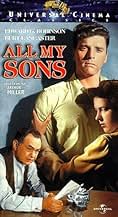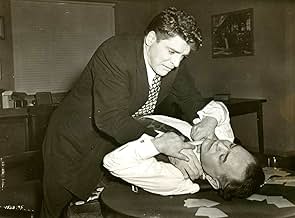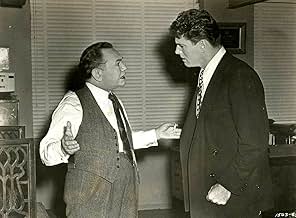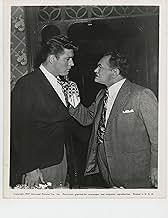Füge eine Handlung in deiner Sprache hinzuDuring WW2, industrialist Joe Keller commits a crime and frames his business partner Herbert Deever but years later his sin comes back to haunt him when Joe's son plans to marry Deever's dau... Alles lesenDuring WW2, industrialist Joe Keller commits a crime and frames his business partner Herbert Deever but years later his sin comes back to haunt him when Joe's son plans to marry Deever's daughter.During WW2, industrialist Joe Keller commits a crime and frames his business partner Herbert Deever but years later his sin comes back to haunt him when Joe's son plans to marry Deever's daughter.
- Regie
- Drehbuch
- Hauptbesetzung
- Auszeichnungen
- 2 Gewinne & 2 Nominierungen insgesamt
- Frank Lubey
- (as Henry Morgan)
- Townswoman
- (Nicht genannt)
- Jorgenson
- (Nicht genannt)
- Mrs. Hamilton
- (Nicht genannt)
- Bartender
- (Nicht genannt)
- Workman
- (Nicht genannt)
- Judge
- (Nicht genannt)
- Halliday
- (Nicht genannt)
- McGraw
- (Nicht genannt)
Empfohlene Bewertungen
The production style and direction (for reasons of cost and utility) let the words of Miller's play take center stage. In beautiful black-and-white, the Art and Set direction are spare, firm, and commanding. They command our attention. Miller is big on attention to the issues his characters are grappling with and their impact on the significant issues of our (and all) time.
As Miller repeats in Death of a Salesman, there are layers of meaning and understanding between his characters and the issues they confront internally and externally. The two business partners have had a long, intimate family relationship (like Cain and Able). So close a connection that his son could have married his partner's daughter. And she, of course, is the only one who has always known (from that son) the truth about the son's death. And the fact (s) about the father.
Miller shows us that the father's Horatio Alger lies are at the foundation of who we are individually and collectively as Americans; the lies can almost thoroughly wash out what individuals and a community should think about its leading citizens. It is an interesting plot twist that, as Miller's script points out, the low-class birth and poverty of the father embed him into the fabric of the community.
That the film faithfully carried Miller's message of contempt and loathing not only for the worship of that false god(capitalism) but also for the whole Horatio Alger hero myth (that both American liberals and conservatives embrace) is quite daring. Even for a film world that had not yet descended into the long night of the "Black List."
It did not take long of course for Hollywood to pounce and to make a version that Miller himself came to despise. This play is not the last in which Miller would show the darker side of the American Dream. Adaptor Chester Erskine has however, carefully removed any of Miller's leftist sentiments and the crime committed by Joe Keller in selling defective cylinders to the US Airforce, which results in the death of 21 pilots, is blamed on Keller's own greed rather than the Capitalist system that created him and so many like him.
To my knowledge there is nothing in the previous films of Irving Reis that would suggest his being capable of doing justice to this material and his direction lacks fluidity. He is aided by the 'noirish' touches of cinematographer Russell Metty and an understated score by Leith Stevens. In keeping with the inevitable compromise of film, some characters, notably Dr. and Mrs. Bayliss, have been diminished. Keller's business partner Deever who has taken the rap for the crime and is only spoken of in the play, is here given a speaking role which is filmically very effective. Deever's daughter Ann is played by Louisa Horton who is not a typical Hollywood glamour puss by any means but whose directness and sincerity make her excellent casting. This was to be her first and only film role of note. Burt Lancaster plays Keller's son Chris. Although keen to improve as an actor, Lancaster's charisma works against him here and he does not really convince as an average Joe. As Deever's son, Howard Gruff is as Duff as ever and strictly one dimensional. The strength of the film lies in the performances of Edward G. Robinson and Mady Christians as Joe and Kate. Robinson is superlative as a man whose outward bonhomie and confidence conceal a terrible sense of guilt. His assertions that he did it 'for the family' have a hollow ring. Kate is living in a fantasy world, clinging to the belief that their son Larry, reported lost in action, will return. The devastating scene in which she reads the letter confirming his death is beautifully played.
Ironically Miller, Robinson and Christians were all summoned by the HUAC for alleged Communist leanings. Miller emerged unscathed, Robinson's 'A' listing suffered throughout the 1950's until Cecil B. de Mille came to his rescue but Christians was not so fortunate. Her outspokenness not only shattered her career but ended her life.
This piece is decidedly not filmed theatre. It is cinema but alas, not great cinema.
Here the opening scenes are middle class and almost mundane and so post war. A son (Burt Lancaster) has returned from war and is planning to marry the girl of his dead brother, killed in the war. The living son's mother can't deal with the fact that her dead son is indeed dead - he died on an aerial mission and his body was never recovered. And thus she is not very supportive of this prospective union.
But this film turns out not to be about war and remembrance and the new middle class at all. Instead it is about a deed past done, and apparently the perpetrator has gotten away with it, and only as the film wears on are all of the secrets revealed, as well as the real reason the mother cannot accept her son's death.
Edward G. Robinson is terrific as the father who is living the American dream after being set out on the sidewalks by his own family since the age of ten. Lancaster with his beaming smile and his head full of bushy hair would look at home in a collegiate letter jacket, and this is a good early showcase for his talents. Harry Morgan appears in a minor role as one of the fathers of the ongoing baby boom.
I haven't said much here about what is really the conflict in this film, because I don't want to give anything away. However, it is a great film about moral conflict versus friend and family and even patriotic obligations, and it is a shame it is so obscure.
A terrific human guilt drama that reflects family pressure and a long-living conscience. Irving Reis's family drama is neither entertaining nor strained, but quite suspenseful. The idea of keeping the mystery unwrapped till the end was certainly new for family dramas back then, or is even today. Also, World War reference and the corporate business culture during the war period fit perfectly here. Joe Keller had been accused of murdering army officers due to a faulty shipment years ago. The court and juries acquitted him and grabbed his business partner, Herb. Now, years later, Herb's daughter and Joe's son want to get married, but Herb's son learns the truth and wants his sister to stay away from Joe and his family. The girl was previously engaged to Joe's first son, who disappeared years ago, and that's why the other son can't marry her as the mother is still hoping for that son to return home. What is the truth? Well, I guess you know it by now, or you can sense it halfway while watching the movie, but that doesn't kill the suspense at all. It eventually becomes more interesting because of its consequences. Things are predictable, but never boring. Every character offers something different. Every character has a problem of its own, and that's how they get involved with each other and then find a solution. The film has terrific speed, and the screenplay makes sure you don't get away from your sofa. The tension feels real and intriguing. Edward G. Robinson is fantastic as the man of the family, the man with the guilt, and the man with the responsibility. I couldn't have imagined him and Burt Lancaster playing father and son in the 40s, but it came out so well. Louisa Horton is another star performer, along with Mady Christians. I shall give full marks to Irving Reis for keeping me hooked and gripped for 95 minutes with the drama that I thought couldn't hold me. Reis makes sure the engagement gets an intellectual and burning ending, so don't miss it.
RATING - 7/10*
By - #samthebestest.
They were both guilty....
It's a wonderful story and very well performed and written, but that fact remains to be discussed.
Wusstest du schon
- WissenswertesThe original Broadway production of "All My Sons" opened at the Coronet Theater in New York on January 29, 1947. It ran for 328 performances, and won the 1947 Best Play Tony Award for author Arthur Miller. His original script was used as the basis for this movie's screenplay.
- PatzerWhen Joe comes out of the house upon Annie's arrival, he comes down the front steps and walks into the yard with his arms raised. In the next instant, he's back at the steps and his arms are down.
- Zitate
Jim Bayliss: Put her to bed, Joe. Both of you go to bed. Staying up won't help; sleep will. Sleep's a wonderful thing, the best thing about living.
- VerbindungenFeatured in Film Preview: Folge #1.1 (1966)
Top-Auswahl
- How long is All My Sons?Powered by Alexa
Details
- Erscheinungsdatum
- Herkunftsland
- Offizielle Standorte
- Sprache
- Auch bekannt als
- All My Sons
- Drehorte
- Santa Rosa, Kalifornien, USA(the Grace home on McDonald Avenue)
- Produktionsfirma
- Weitere beteiligte Unternehmen bei IMDbPro anzeigen
- Laufzeit1 Stunde 34 Minuten
- Farbe
- Seitenverhältnis
- 1.37 : 1
Zu dieser Seite beitragen























